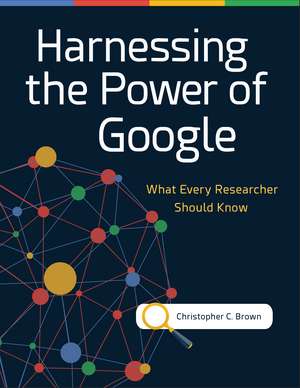Harnessing the Power of Google: What Every Researcher Should Know
Autor Christopher C. Brownen Limba Engleză Paperback – 8 iun 2017 – vârsta până la 17 ani
Preț: 329.91 lei
Preț vechi: 384.22 lei
-14% Nou
Puncte Express: 495
Preț estimativ în valută:
63.13€ • 66.21$ • 52.55£
63.13€ • 66.21$ • 52.55£
Carte tipărită la comandă
Livrare economică 01-15 aprilie
Preluare comenzi: 021 569.72.76
Specificații
ISBN-13: 9781440857126
ISBN-10: 1440857121
Pagini: 150
Ilustrații: 42 bw illus
Dimensiuni: 156 x 235 mm
Greutate: 0.25 kg
Editura: Bloomsbury Publishing
Colecția Libraries Unlimited
Locul publicării:New York, United States
ISBN-10: 1440857121
Pagini: 150
Ilustrații: 42 bw illus
Dimensiuni: 156 x 235 mm
Greutate: 0.25 kg
Editura: Bloomsbury Publishing
Colecția Libraries Unlimited
Locul publicării:New York, United States
Caracteristici
Written by an active reference technology librarian with three decades of experience, and who helps undergraduate and graduate students in areas such as public policy, international studies, statistics, and government information on a daily basis
Notă biografică
Christopher C. Brown is reference technology information librarian at the University of Denver Main Library and has been teaching as an affiliate faculty member in the University of Denver Library and Information Science program since 1999.
Cuprins
IllustrationsIntroductionChapter 1: Searching GenerallyHistory of SearchingTension between Controlled Vocabulary and Full TextualitySubject Headings vs. Subject DescriptorsFull-Text Searching: A Different Way of ThinkingReferenceChapter 2: How Google WorksCrawling and IndexingRanking of ResultsBeyond Google's ReachGeneral Google Search TipsIndirect Searching-Hidden Internet ContentReferenceChapter 3: Searching Google WebBasic Search TechniquesPower Search TechniquesKeyword FormulationEvaluating Web ContentCached ContentReferenceChapter 4: Power Searching for Primary Sources Using Google WebSite-Specific Google SearchingSite Searching on the International LevelSite Searching on the Foreign Government LevelSite Searching on the U.S. National LevelSite Searching on the State Government LevelSite Searching on the Local Level (Counties and Communities)Site Searching for Commercial ContentSite Searching for Nonprofit ContentReferenceChapter 5: Google Scholar and Scholarly ContentDepth of Searching in Google ScholarWhat Content Does Google Scholar Retrieve?Books-From Google BooksEvaluating Google Scholar ContentRight Margin LinksLeft SidebarCitation-Specific LinksEffective Searching in ScholarGoogle Scholar MetricsReferencesChapter 6: Google BooksLibrary ProjectGoogle Books Partner ProgramGoogle Book ViewsSearching and Navigating Google BooksThe "Fulfillment" PartHow Complete Is Google Books?Government Documents in Google BooksMagazines in Google BooksGoogle Books and HathiTrustGoogle Books and the Internet ArchiveFingers and Hands in Google BooksCiting Google BooksReferencesChapter 7: Google as a Complement to Library ToolsWhat's Wrong with Academic LibrariesThe Three GooglesWhat's Right with Academic LibrariesThe "Flattening" of Information SourcesThe "Holy Grail" of Search Results in the Google AgeReferenceChapter 8: Academic Research HacksNo Country Redirection (NCR) searchingGoogle Books Ngram ViewerImage SearchingGoogle TranslateLegal CasesSearching PatentsReferencesChapter 9: Case Studies in Academic ResearchCase Study 1: Resources on Human TraffickingCase Study 2: Funding for Religious Schools in Tanzania and South AfricaCase Study 3: Paris Tango House Fashion from the 1920sCase Study 4: Data on Geothermal Heat PumpsChapter 10: Searching for StatisticsStep One: Determine Who Cares about the Statistics You Are SeekingStep Two: Search within the Internet Domain of the Entities Likely to Issue StatisticsKeyword Searching and StatisticsStatistics Case Study 1: Immigrant Statistics for the United StatesStatistics Case Study 2: Subnational Data for UgandaConclusionIndex
Recenzii
The book's overarching question is 'how do we think about information if it is not first categorized and normalized for us' through subject headings and similar guideposts. Brown's goal is to provide an answer to that question by laying out a well-drawn roadmap that will enable students, researchers, teachers, professors, and librarians to confidently find, use, and cite authoritative primary and secondary sources using Google. As a business researcher, I find Brown's book to be exceptionally helpful and confidence-building (even if my copy is by now a bit disfigured with multiple margin notes and highlights). It's a must-have resource not only for academic librarians, but also for all serious researchers.
This title is more than just for a librarian audience, who through their professional degrees have some background in how Google does (and does not) work like a research database. . . . [H]elpful for the upper level undergraduate or new graduate student transitioning from using Google Web as a default tool for all research to a more nuanced researcher, utilizing many types of tools, including Google Web, as research context dictates.
This title is more than just for a librarian audience, who through their professional degrees have some background in how Google does (and does not) work like a research database. . . . [H]elpful for the upper level undergraduate or new graduate student transitioning from using Google Web as a default tool for all research to a more nuanced researcher, utilizing many types of tools, including Google Web, as research context dictates.
